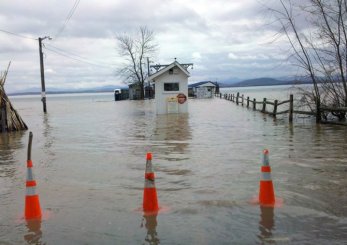
Last year’s flooding caused major problems in the Champlain valley. Rivers overflowed, and Lake Champlain rose to record heights causing a lot of damage to the shore and many shore-line properties. I remember seeing the Essex-Charlotte ferry dock covered in water all the way up to the dockmaster’s booth!
Nearby roads were also damaged by the rising waters, including the main road in Essex!
“The pavement began to crack in deep fissures running parallel to the lake as the weight of the road cause it to settle and slough. The remedy involved 250 tons — approximately ten tandem dump truck loads — of riprap dumped over the side of the road to arrest further erosion and stabilize the road.” (Rosslyn Redux)
This year we’ve been very fortunate in the Champlain Valley to have avoided any major flooding and storms that would have caused more destruction as we rebuilt.
“Lake Champlain water levels are low. Our waterfront weathered winter — what winter there was — and spring without incurring the destructive flooding which tormented us a year ago.” (Rosslyn Redux)
Flood Preventive Study

This disaster has caused a lot of people to think to the future to try to form preventive measures that would lessen the impact and damages that could occur when another flood arises. A joint committee of people from New York, Vermont, and Canada met up to discuss and study what happened and ways to minimize future flooding problems.
“About 70 people gathered at two public meetings [in August] to talk about the flooding in Lake Champlain and the Richelieu River in spring 2011. During the 2011 spring floods, Lake Champlain water levels topped a record high 103 feet. […]
The final study, with recommendations for policy and possible landscape changes, will be published in December. […] none of the recommendations will be mandated, they will all be suggestions to prevent future floods.” (North Country Public Radio)
Prepare for Future Disasters

This year we’ve actually had low water levels and drought-like weather during the summer. Our neighbors to the south are currently dealing with the destruction caused by Hurricane Sandy that thankfully missed us. Though last year’s record flooding has not been repeated here this year there is no guarantee that good weather will remain in our favor.
“The historic floods of 2011 that brought tragic losses to many communities also put issues such as water quality, shoreline stabilization, and climate change into sharp focus in the region and across the globe.” (Lake Champlain Basin Program)
We must learn from what happened during the 2011 Flood of Lake Champlain Basin, realize what mistakes were made, and continue to make progress on measures that will prepare us to successfully deal with natural disasters and hopefully decrease the negative effects and damages brought on by such events.
Related articles





Leave a Reply